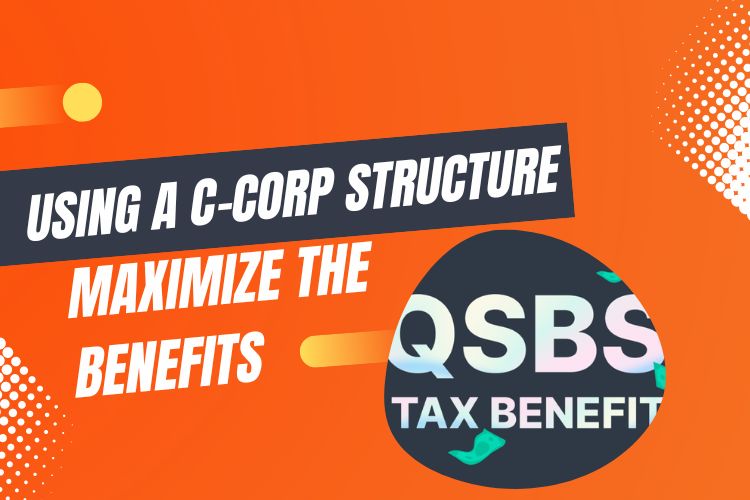
Using a C-Corp Structure to Maximize the Benefits of Qualified Small Business Stock Under Internal Revenue Code Section 1202
Entrepreneurs are constantly looking for ways to maximize their financial strategies for development and success in today’s constantly changing company environment.
Creating a C-Corporation (C-Corp) to be eligible for qualified small company shares is one of these options. (QSBS). The conditions, advantages, and procedures for setting up a C-Corp for QSBS eligibility will be covered in this article.
For Qualified Small Business Stock, there are requirements.

A business must fulfill the following criteria to be considered a QSBS:
- C-Corp Structure: The company must be set up in the United States as a C-Corp.
- Domestic Business: The corporation must carry out a sizable portion of its operations domestically.
- Gross Assets Limit: Prior to and immediately following the stock issuance, the company’s total gross assets should not exceed $50 million.
- Active Business Requirement: The corporation must actively operate a qualified trade or business with at least 80% of its assets.
- Holding Period: To qualify for tax advantages, investors must hold the QSBS for a minimum of five years.
Industries that focus heavily on R&D, manufacturing, and technology-based services are more likely to be eligible for Qualified Small Business Stock (QSBS).
These sectors are eligible for QSBS treatment because the Internal Revenue Code (IRC) Section 1202 views them as active trades or companies.

Some sectors that are more likely to be eligible for QSBS are:
- Companies in technology involved in software development, hardware production, cybersecurity, and artificial intelligence.
- Biotechnology and pharmaceuticals: Businesses involved in the creation, testing, or production of novel medications and medical equipment.
- Clean Energy: Organizations engaged in the research and development of renewable energy technologies, such as hydroelectric, solar, and wind energy.
- Advanced Manufacturing: Businesses involved in the design, development, and production of cutting-edge manufacturing technology like robotics or sophisticated materials.
- Agriculture Technology: Firms specializing in cutting-edge approaches to precision agriculture, crop optimization, and sustainable farming.
- Telecommunications: Businesses engaged in the creation and implementation of cutting-edge infrastructure and communication technologies.
- Transportation Technology: Firms developing cutting-edge mobility options like electric cars, self-driving cars, and cutting-edge infrastructure.
However, for the purposes of the QSBS, several industries are expressly excluded from the definition of qualified crafts or companies. These industries are typically service-based or involve passive revenue.

The following sectors are less likely to be eligible for QSBS:
- Financial Services: Banks, insurance providers, investment businesses, and other companies that offer financial services.
- Professional Services: Businesses that offer consulting, legal, accounting, and other specialized services.
- Hospitality: This category includes inns, eateries, bars, and other establishments.
- Real estate: Investment, brokerage, development, and management of real estate.
- Healthcare Services: Hospitals, clinics, and other healthcare service providers; research-and-development-focused biotechnology or pharmaceutical firms are excluded.
Benefits of Qualified Small Business Stock

1. Capital Gains Exclusion:
The qualifying small business stock (QSBS) capital gain exclusion is a substantial tax benefit for investors because it enables them to exempt all or a portion of their capital gains from federal income tax upon the sale of QSBS, subject to certain restrictions.
This tax benefit can result in significant tax savings, which makes purchasing QSBS an appealing alternative.
Limitations on the Exclusion of Capital Gains:

Exclusion Percentage:
The exclusion percentage can change depending on when the QSBS was purchased. Investors can exclude 100% of capital gains for QSBS acquired after September 27, 2010, but only 50% or 75% for QSBS acquired prior to that date.
Maximum Exclusion Amount:
The maximum capital gain exclusion is $10 million, less any amounts previously excluded under this clause, or 10 times the investor’s adjusted basis in the QSBS. The adjusted basis is typically equal to the purchase price of the stock plus any subsequent investments in the business.
An investor’s capital gain, for instance, would be $11 million if they bought QSBS for $1 million and later sold it for $12 million.
The maximum amount they may remove is $10 million, which in this situation is the same as 10 times the adjusted basis ($1 million x 10 = $10 million).
The investor might so subtract $10 million in capital gains, leaving only $1 million due to federal income tax.
Five-Year Holding Period:

Investors must hold the QSBS for at least five years in order to qualify for the capital gain exclusion. The exclusion will not apply if the holding period is less, and all capital gains will be subject to federal income tax.
Qualified Trade or Business:
According to the Internal Revenue Code, the issuing corporation must be engaged in a qualified trade or business.
Individual Investors and Investors in Pass-Through Entities:
Individual Investors and Investors in Pass-Through Entities, such as Partnerships, S Corporations, and Certain Trusts, are Eligible for the Capital Gain Exclusion for QSBS. However, the QSBS capital gain exclusion is not available to C corporations.
2. Rollover Provision:
Investors can postpone paying capital gains tax on their first investment if they sell a QSBS and reinvest the proceeds into another QSBS within 60 days.
3. Tax-Free Gains:

QSBS gains may be tax-free for federal income tax purposes, subject to some restrictions.
4. Attractive to Investors:
Due to the possible tax advantages, companies that qualify for QSBS may attract more investors.
A company’s ability to raise money can be improved by setting up a C-Corp to be eligible for QSBS. This can offer investors significant tax benefits.
Entrepreneurs can take use of the benefits of QSBS to advance their company by comprehending the standards and taking the necessary actions to establish a C-Corp. To set up a C-Corp for QSBS Eligibility, speak with an attorney and CPA if you think your company could benefit from QSBS.
